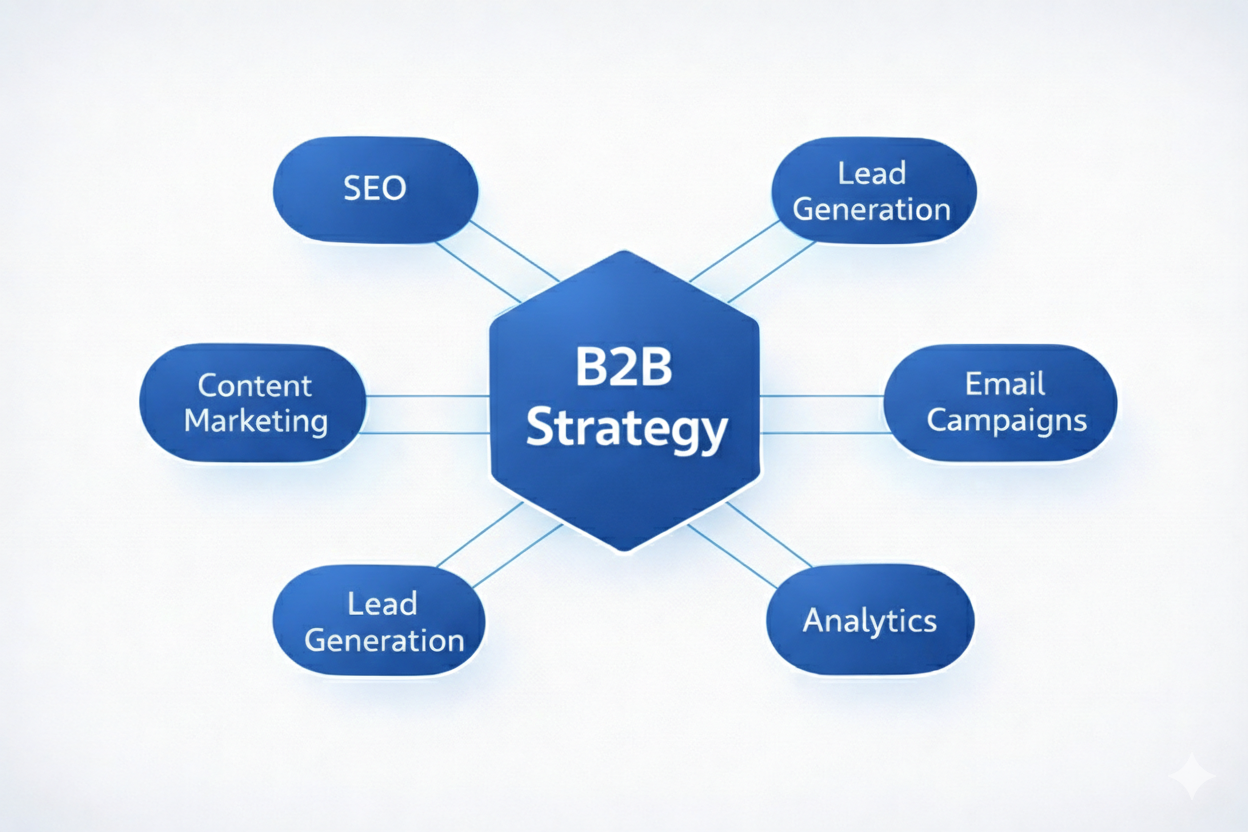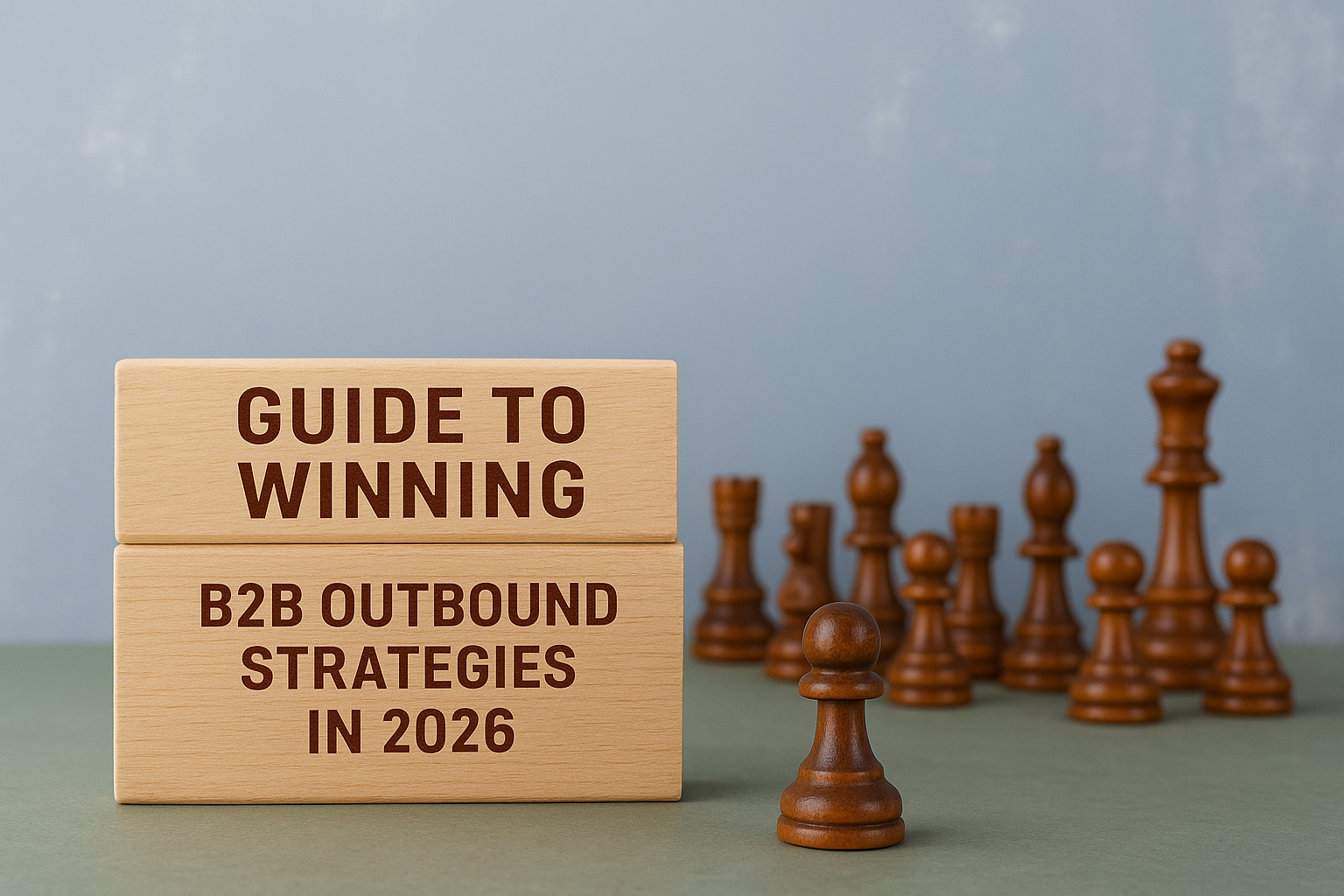Do you think social media is just for sharing cat videos and vacation pics? Think again! While it’s a great way to stay connected with friends and family, social media has become a powerful tool for businesses too, especially those in the B2B industry.
Just imagine billions of potential customers scrolling through their feeds every day – that’s a massive audience just waiting to be reached!
This blog dives into the world of B2B social media marketing. We’ll explore why social media is so crucial for businesses, and how building a solid presence can help you connect with the right audience, build brand awareness, and ultimately, drive growth.
So, whether you’re a seasoned social media pro or just starting out, this blog will help you with the knowledge to leverage the power of social media for your B2B business.
Let’s ditch the outdated image of B2B marketing, which is all dry press releases and stuffy conferences. It’s time to embrace the dynamic world of social media and connect with your target audience in a whole new way!
Table of Contents
ToggleWhat is B2B Marketing?
B2B (Business-to-Business) marketing refers to the strategies and practices companies use to promote their products or services to other businesses, rather than individual consumers. Unlike B2C (Business-to-Consumer) marketing, which focuses on quick purchases driven by emotions, B2B marketing emphasizes building long-term relationships, addressing business needs, and demonstrating measurable ROI. It often involves complex buying cycles, multiple decision-makers, and highly personalized communication.
In simple terms, B2B marketing is about creating value, trust, and solutions that help other businesses grow.
Why is Social Media Important for B2B Marketing?
Social media is a critical component of B2B marketing because it provides businesses with a way to connect with potential customers, build brand awareness, and drive traffic to their websites. Here are a few reasons why social media is so important for B2B marketing:
1# Build Relationships with Customers
Social media marketing is a great way for businesses to connect with potential customers and build relationships with them. By engaging with followers on social media, businesses can gain insight into their needs and preferences, answer their questions, and provide value through educational content. This helps businesses establish trust and credibility with their audience, which can lead to increased brand loyalty and ultimately, more sales.
2# Increase Visibility
Regular posting helps more people see your business. Even if someone is not ready to work with you right now, your content keeps your brand in their mind. Over time, this builds recognition and positions you as a trusted name in your field.
3# Drive Traffic to Your Website
Sharing links to case studies, blog posts, or service pages encourages people to visit your site. When the content is relevant, that traffic often turns into leads or direct inquiries.
4# Cost-Friendly Marketing
Compared to events or print ads, social media is often cheaper and easier to track. Even small budgets can bring results with the right targeting and consistent effort.
5# Keep Up With Competitors
If your competitors are active and you are not, you risk being overlooked. Having a consistent presence shows you are engaged and professional.
How to Use Social Media for B2B Marketing?
Now that we’ve established why social media is important for B2B marketing, let’s talk about how businesses can use social media effectively. Here are a few tips:
1# Know Your Audience
Figure out who you want to reach and what they care about. Look at their roles, challenges, and what type of content they engage with. This helps you create posts that get attention and feel useful.
2# Choose the Right Platforms
Not every platform works the same. LinkedIn is often the top choice for B2B because it is designed for professionals. Twitter works well for quick updates, while YouTube is useful for product demos and explainers. Pick platforms that match your audience rather than trying to be everywhere.
3# Share Helpful Content
People follow accounts that give them value. Share insights, how-to posts, customer success stories, and updates from your industry. Aim for content that solves problems or answers common questions.
4# Show the Human Side
Even in B2B, people want to know who they are working with. Share team highlights, company culture, and client stories. This builds trust and makes your brand approachable.
5# Engage in Conversations
Don’t just post and leave. Reply to comments, join industry discussions, and thank people for sharing your content. Small interactions can lead to long-term relationships.
6# Use Paid Ads When Needed
Organic reach is limited, so paid campaigns can help you target specific industries, roles, or company sizes. Start small, test different formats, and focus on leads rather than vanity metrics.
7# Track What Works
Look at results beyond likes or shares. Monitor traffic from social media, new leads, and engagement on important posts. Use that information to adjust your strategy and improve over time.
Best Social Media Platforms for B2B Marketing
Not every social platform works the same for B2B. Choosing the right ones helps you reach the people who matter without wasting effort.
LinkedIn is the top choice for most B2B companies. It’s where professionals go to network, learn, and explore business solutions. Thought leadership articles, case studies, and industry updates work well here.
Twitter (X) is better for quick updates, news, and conversations around trends. It helps brands stay part of real-time discussions.
YouTube is powerful for tutorials, demos, and explainer videos. Visual content makes it easier to explain complex solutions.
Instagram works well for brand awareness and showcasing company culture. It’s also effective for industries where visuals matter, like design, events, or tech products.
Facebook can be useful for communities and groups, though it’s less common for direct B2B lead generation.
You don’t need to be everywhere. Focus on the platforms where your audience is most active.
Types of Content That Work Best in B2B Social Media
Content should help your audience solve problems, learn something new, or see how your solution fits their needs. Some formats that perform well in B2B are:
-
Thought leadership posts where you share insights on industry challenges and solutions
-
Case studies that show real results from existing clients
-
Short videos explaining a process, product feature, or industry tip
-
Infographics that break down complex data into easy visuals
-
Polls and questions that encourage interaction and feedback
-
Webinar and event promotions to attract leads and share expertise
Mixing formats keeps your feed interesting and helps you reach different types of learners.
Trends Shaping B2B Social Media Marketing
B2B social media keeps changing as new tools and habits appear. A few key trends in 2025 are:
-
AI-driven personalization where platforms suggest content tailored to each user’s interests
-
Employee advocacy, where team members share company content on their own profiles to expand reach
-
Short-form video on LinkedIn, YouTube Shorts, and Instagram Reels for quick tips and insights
-
Social selling, where sales teams build relationships directly on LinkedIn instead of cold outreach
-
Private communities on platforms like Slack, Discord, or LinkedIn groups for focused networking
Staying updated on these trends helps you keep your content relevant and engaging.
Examples of Successful B2B Social Media Campaigns
Learning from others can spark ideas for your own strategy. Here are a few examples:
-
HubSpot shares free resources, templates, and guides on LinkedIn, positioning themselves as a go-to source for marketing advice.
-
IBM uses thought leadership content and video storytelling to highlight innovation and customer success stories.
-
Slack runs campaigns focused on remote work tips and collaboration, tying content directly to the problems their product solves.
-
Adobe uses Instagram and YouTube to showcase customer projects, putting the spotlight on their users instead of just their tools.
These examples show that consistency, value-driven content, and a human voice make a difference.
Common Mistakes B2B Brands Make on Social Media
Many B2B companies set up accounts but fail to use them effectively. Some mistakes to avoid are:
-
Posting only promotional content without adding value
-
Being inconsistent, which makes the account look inactive
-
Ignoring comments or messages from followers
-
Using the same content on all platforms without adjusting the format
-
Chasing vanity metrics like likes instead of tracking real results such as leads or inquiries
A consistent and audience-focused approach works better than posting for the sake of it.
Conclusion
Social media has become an important channel for B2B marketing. It helps companies reach the right people, build trust, and create new leads without heavy costs. With the right platforms and consistent content, you can show your expertise and keep your brand visible.
The key is to focus on your audience. Share content that solves problems, stay active in conversations, and measure results that matter, like leads and traffic. Trends will keep changing, but the basics of trust, value, and consistency remain the same.
If you want to improve your B2B marketing game, contact us now.
FAQs
1. Isn’t social media just for B2C companies? What can B2B businesses gain from it?
While social media platforms might seem filled with consumer-focused content, B2B businesses have a lot to gain! Social media allows you to:
- Connect with decision-makers: Imagine directly reaching key players in other companies – social media helps you build relationships and nurture leads.
- Build brand awareness: Showcase your expertise, share industry insights, and position yourself as a thought leader in your field.
- Generate leads: Targeted social media campaigns can attract potential customers and drive traffic to your website.
2. What are some of the biggest challenges of B2B social media marketing?
B2B marketing requires a different approach than B2C. Here are some challenges to consider:
- Engaging a professional audience: B2B content needs to be informative and valuable, keeping your audience engaged without being salesy.
- Standing out from the crowd: With so much content online, creating unique and relevant content can be tough.
- Measuring success: Tracking the effectiveness of your B2B social media efforts requires going beyond just likes and shares.
3. How can I measure the success of my B2B social media marketing?
There are several metrics to track the impact of your B2B social media campaigns. Here are a few key ones:
- Lead generation: Track how many leads you generate through social media channels.
- Website traffic: See how many people visit your website from social media referrals.
- Engagement: Look at metrics like likes, comments, and shares to gauge audience engagement with your content.






